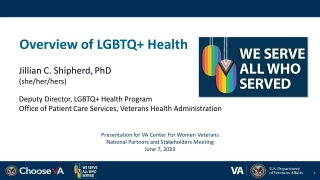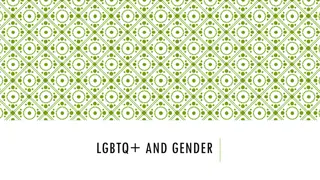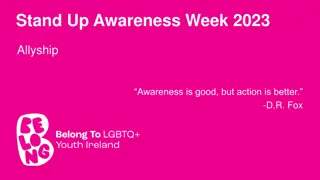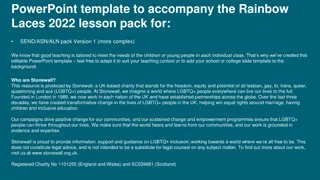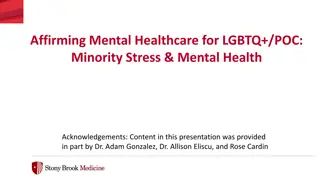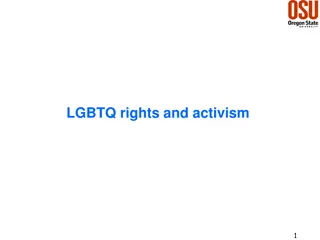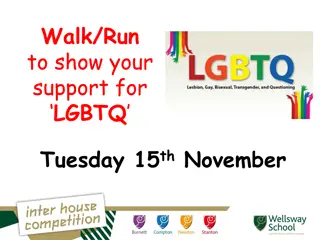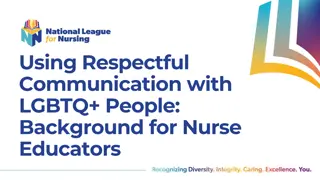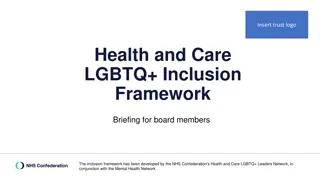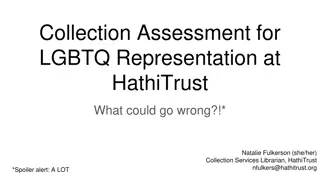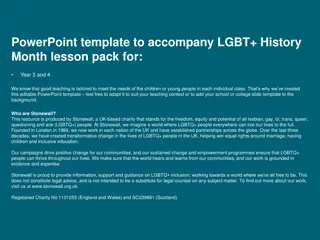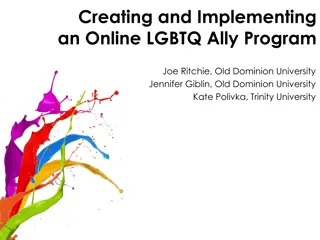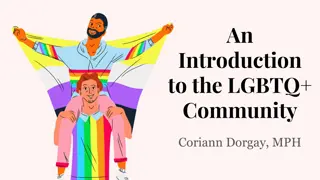LGBTQ+ Representation in Sports
Explore the stories of LGBTQ+ athletes in various sports, highlighting their achievements and contributions. Discover how these individuals have overcome challenges and barriers to excel in their respective fields while proudly living their authentic selves. Gain insight into the importance of inclusion and diversity in sports through real-life examples of courage and determination.
Download Presentation

Please find below an Image/Link to download the presentation.
The content on the website is provided AS IS for your information and personal use only. It may not be sold, licensed, or shared on other websites without obtaining consent from the author.If you encounter any issues during the download, it is possible that the publisher has removed the file from their server.
You are allowed to download the files provided on this website for personal or commercial use, subject to the condition that they are used lawfully. All files are the property of their respective owners.
The content on the website is provided AS IS for your information and personal use only. It may not be sold, licensed, or shared on other websites without obtaining consent from the author.
E N D
Presentation Transcript
PowerPoint template to accompany the Rainbow Laces 2022 lesson pack for: Key Stage 4 and Post-16 England and Wales S4 to S6 - Scotland We know that good teaching is tailored to meet the needs of the children or young people in each individual class. That s why we ve created this editable PowerPoint template feel free to adapt it to suit your teaching context or to add your school or college slide template to the background. Who are Stonewall? This resource is produced by Stonewall, a UK-based charity that stands for the freedom, equity and potential of all lesbian, gay, bi, trans, queer, questioning and ace (LGBTQ+) people. At Stonewall, we imagine a world where LGBTQ+ people everywhere can live our lives to the full. Founded in London in 1989, we now work in each nation of the UK and have established partnerships across the globe. Over the last three decades, we have created transformative change in the lives of LGBTQ+ people in the UK, helping win equal rights around marriage, having children and inclusive education. Our campaigns drive positive change for our communities, and our sustained change and empowerment programmes ensure that LGBTQ+ people can thrive throughout our lives. We make sure that the world hears and learns from our communities, and our work is grounded in evidence and expertise. Stonewall is proud to provide information, support and guidance on LGBTQ+ inclusion; working towards a world where we re all free to be. This does not constitute legal advice, and is not intended to be a substitute for legal counsel on any subject matter. To find out more about our work, visit us at www.stonewall.org.uk. Registered Charity No 1101255 (England and Wales) and SC039681 (Scotland)
To be able to use statistics to support an argument Lizzie Williams is a wheelchair racer. She competes for Britain. Lizzie also happens to be a lesbian. Beth Mead plays football for England. As the top goal scorer during the 2022 European Championships, Beth was named player of the tournament. She s also gay. Layshia Clarendon is a basketball player. Layshia is non-binary and lives with their wife and child. Jake Daniels plays football for Blackpool. As well as making his first team debut in 2022, he came out as gay in an interview with Sky Sports.
To be able to use statistics to support an argument Stacey Frances-Bayman has played netball for England. Her wife is also a netball player. Duttee Chand is the Indian 100m women s champion. She felt able to talk about her girlfriend once homosexuality was decriminalized in India. Pat Manuel is a professional boxer. He was the first trans person in the USA to become a professional boxer. Ryan Russell is an American Football player. When he came out as bi, he made international news.
To be able to use statistics to support an argument Robyn Lambird is a wheelchair racer. Robyn is a former wheelchair rugby player and is also non-binary. Ruby Tui plays rugby for New Zealand. Her girlfriend, Dani, is a journalist.
To be able to use statistics to support an argument What challenges can people face as a consequence of being LGBTQ+?
To be able to use statistics to support an argument What impact might homophobia, biphobia or transphobia have on a person?
To be able to use statistics to support an argument 36% of LGBT people say they aren t comfortable walking down the street while holding their partner's hand. 40% of trans people adjust the way they dress because of fear of discrimination and harassment. 72% of LGBT young people aged 18 to 24 have seen homophobic, biphobic and transphobic abuse online recently. 19% of LGBT disabled people have been discriminated against in shops and stores 48% of trans people do not feel comfortable using public toilets
To be able to use statistics to support an argument 43% of LGBT people think public sporting events aren t a welcoming space for LGBT people. One in ten LGBT people who attended a live sporting event in the last year experienced discrimination because of their sexual orientation and/or gender identity. 38% of trans people avoid going to the gym or participating in sports groups because of fear of discrimination and harassment 11% of LGBT people have been discriminated against while exercising at a fitness club or taking part in group sport in the last year
To be able to use statistics to support an argument Stonewall s Rainbow Laces Campaign works towards making sport everyone s game. Why might this campaign be needed? What might the impact of homophobia, biphobia and transphobia in sport be?
To be able to use statistics to support an argument Create a news report. You should: Highlight the impact of homophobia, biphobia and transphobia in sport Use the Stonewall statistics to support your argument
To be able to use statistics to support an argument Let s make sport everyone s game.


